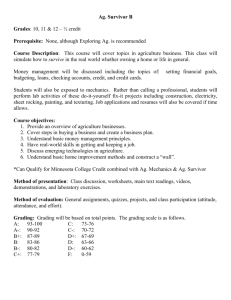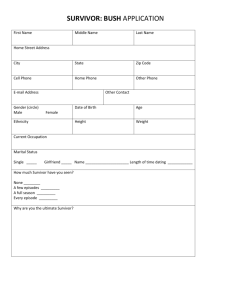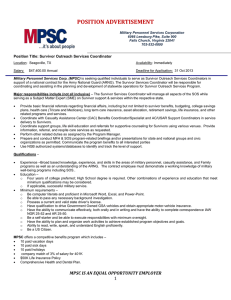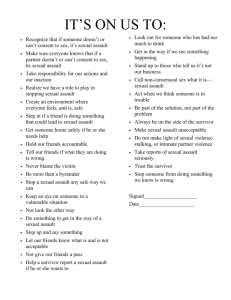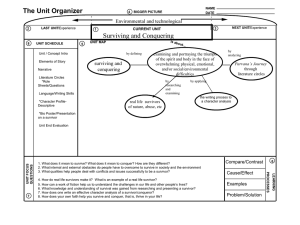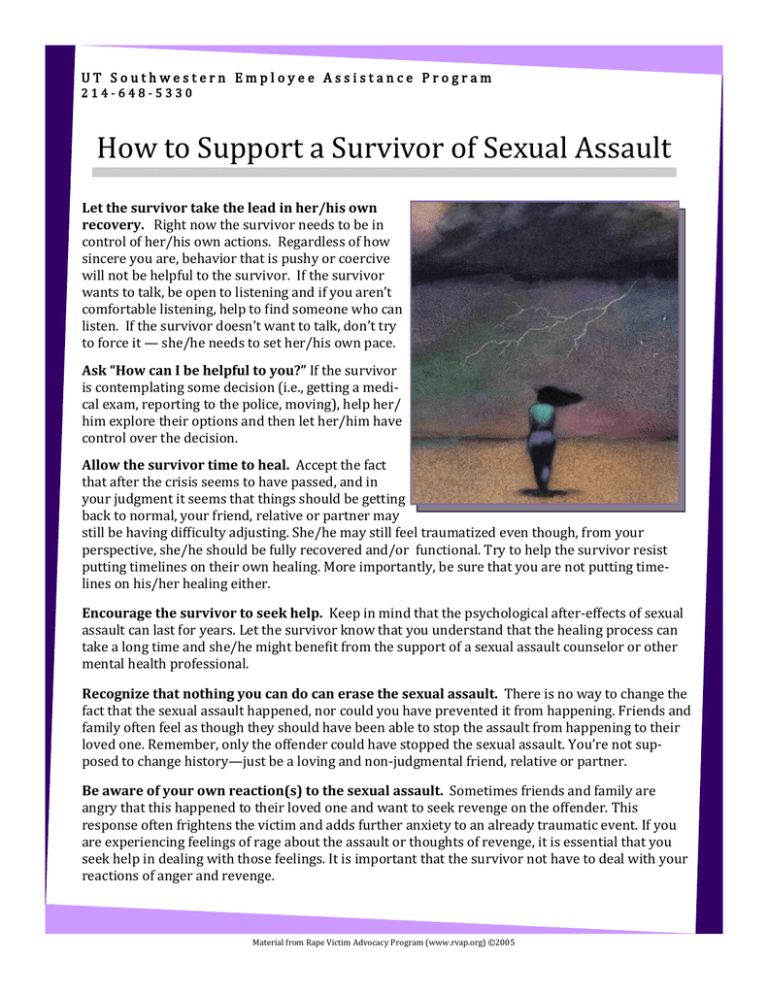
UT Southwestern Employee Assistance Program
214-648-5330
How to Support a Survivor of Sexual Assault
Let the survivor take the lead in her/his own
recovery. Right now the survivor needs to be in
control of her/his own actions. Regardless of how
sincere you are, behavior that is pushy or coercive
will not be helpful to the survivor. If the survivor
wants to talk, be open to listening and if you aren’t
comfortable listening, help to find someone who can
listen. If the survivor doesn’t want to talk, don’t try
to force it — she/he needs to set her/his own pace.
Ask “How can I be helpful to you?” If the survivor
is contemplating some decision (i.e., getting a medical exam, reporting to the police, moving), help her/
him explore their options and then let her/him have
control over the decision.
Allow the survivor time to heal. Accept the fact
that after the crisis seems to have passed, and in
your judgment it seems that things should be getting
back to normal, your friend, relative or partner may
still be having difficulty adjusting. She/he may still feel traumatized even though, from your
perspective, she/he should be fully recovered and/or functional. Try to help the survivor resist
putting timelines on their own healing. More importantly, be sure that you are not putting timelines on his/her healing either.
Encourage the survivor to seek help. Keep in mind that the psychological after-effects of sexual
assault can last for years. Let the survivor know that you understand that the healing process can
take a long time and she/he might benefit from the support of a sexual assault counselor or other
mental health professional.
Recognize that nothing you can do can erase the sexual assault. There is no way to change the
fact that the sexual assault happened, nor could you have prevented it from happening. Friends and
family often feel as though they should have been able to stop the assault from happening to their
loved one. Remember, only the offender could have stopped the sexual assault. You’re not supposed to change history—just be a loving and non-judgmental friend, relative or partner.
Be aware of your own reaction(s) to the sexual assault. Sometimes friends and family are
angry that this happened to their loved one and want to seek revenge on the offender. This
response often frightens the victim and adds further anxiety to an already traumatic event. If you
are experiencing feelings of rage about the assault or thoughts of revenge, it is essential that you
seek help in dealing with those feelings. It is important that the survivor not have to deal with your
reactions of anger and revenge.
Material from Rape Victim Advocacy Program (www.rvap.org) ©2005
Accept the survivor’s experience the way it happened. Don’t second-guess the survivor's
behavior. “You should haves” or “you shouldn’t haves” (ex., "you should have fought") can only
increase the pain after the fact. This is not helpful to the survivor. Don’t focus on the survivor's
behavior when it is the offender’s behavior that should be condemned. Nothing the survivor did or
didn’t do caused what happened to her/him.
Don’t use comparisons. It doesn’t help to compare your loved one’s experience with others who
have been sexually assaulted. Someday she/he might want to learn more about the reactions of
other sexual assault survivors, but any such discussion should be at her/his own request.
Don’t talk about what “could have happened.” The survivor already knows how much worse it
could have been. Remember that during the attack, it is not uncommon for a survivor to fear for
their life. It’s up to them to decide whether or not they were “lucky” to have survived and not have
been more seriously injured.
Face the issue. Well-meaning people often tell the survivor of a crisis, “don’t worry/don’t cry/
don’t think about it.” This is asking the impossible and it’s not helpful to someone who has been
sexually assaulted. Keep in mind that neither the crime nor its aftermath will go away by ignoring
it. Telling your loved one to deny or downplay the experience she/he has just been through might
suggest that your discomfort for the situation is greater than your concern for them.
Be ready to listen. If the survivor chooses to talk about the sexual assault, try to listen nonjudgmentally and don’t ask specific questions. Your interest in knowing the details of the sexual
assault should not overpower your desire to be supportive and gentle with the survivor. Offer the
opportunity to talk but never insist that talking will cure the survivor. Remember, your loved one
has just been coerced and won’t be helped by further coercion, however well meant.
Respect her/his confidentiality. Your friend, family member, or partner needs to have control
over the details of her/his assault. She/he needs to decide who knows about the assault and how
much is shared. Ask her/him what they want others to know and respect their wishes if they
choose not to share information about what happened.
Assist with routine tasks. For some time after the attack, routine chores and responsibilities may
seem burdensome for your friend, relative or partner. This person may be grateful for assistance
with errands, child care, laundry, etc. To the extent that you are able, offer to help with these tasks
and be prepared to follow through.
Use your own experiences to guide you. Think about the times in your life when you’ve felt
vulnerable or faced a crisis: the death of someone you loved, the end of a marriage, a lifethreatening illness, or loss of a job. Remember what helped you the most. Chances are it wasn’t any
one conversation or any one action, but rather the knowledge that friends believed you, empathized with your pain, were on your side, and were committed to seeing you through hard times.
Get support for yourself. Sexual assault counselors and professional therapists are aware that
the violence of the act can affect others close to the survivor. These professionals can respond
directly to your questions and concerns. Your willingness to get support for yourself and information for the survivor can help with the healing process for everyone.
If you or a loved one has been sexually assaulted, please call the National Sexual Assault
Hotline at 1-800-526-HOPE(4673). Trained volunteers are available 24/7 to provide free
and confidential support and assistance.
Material from Rape Victim Advocacy Program (www.rvap.org) ©2005

